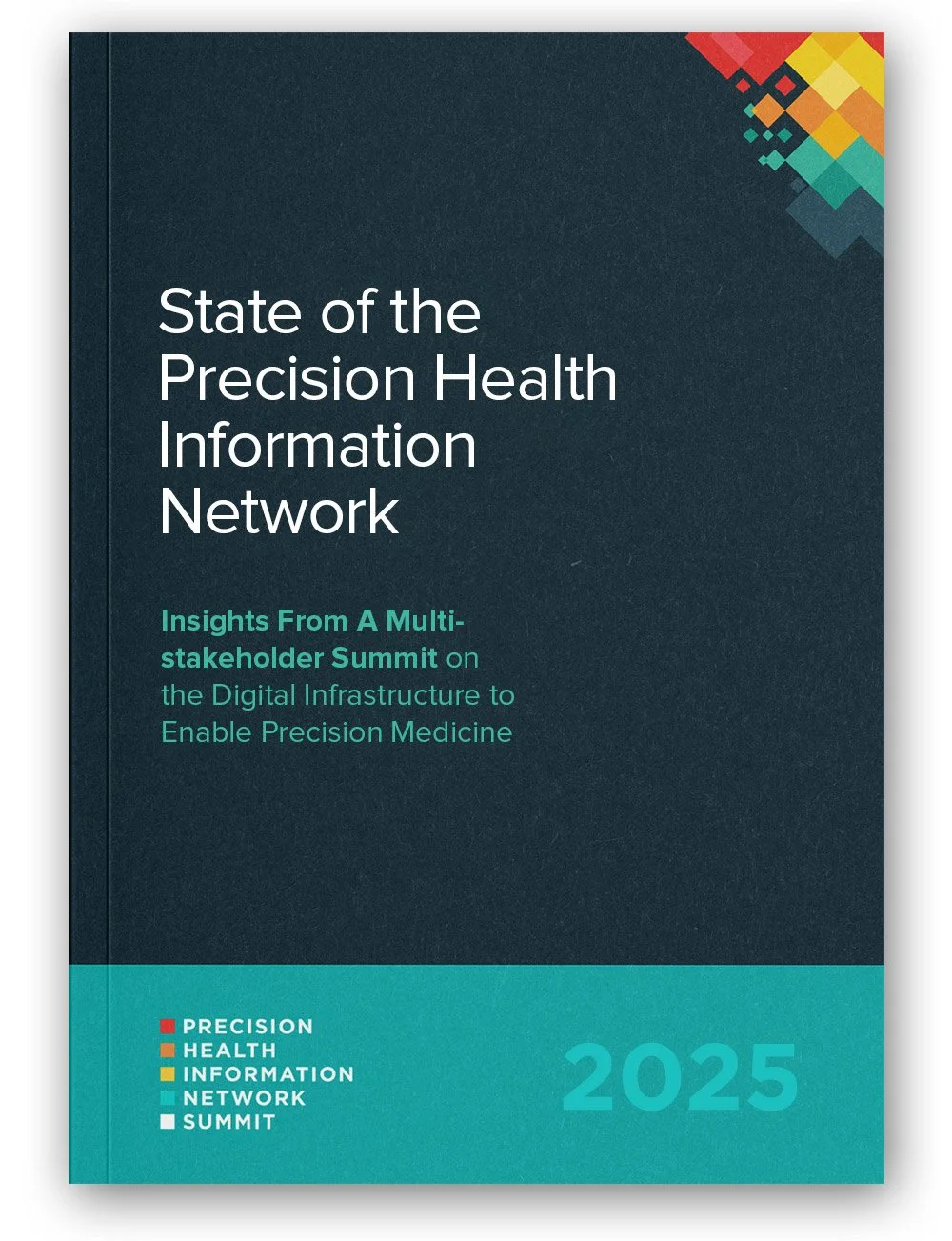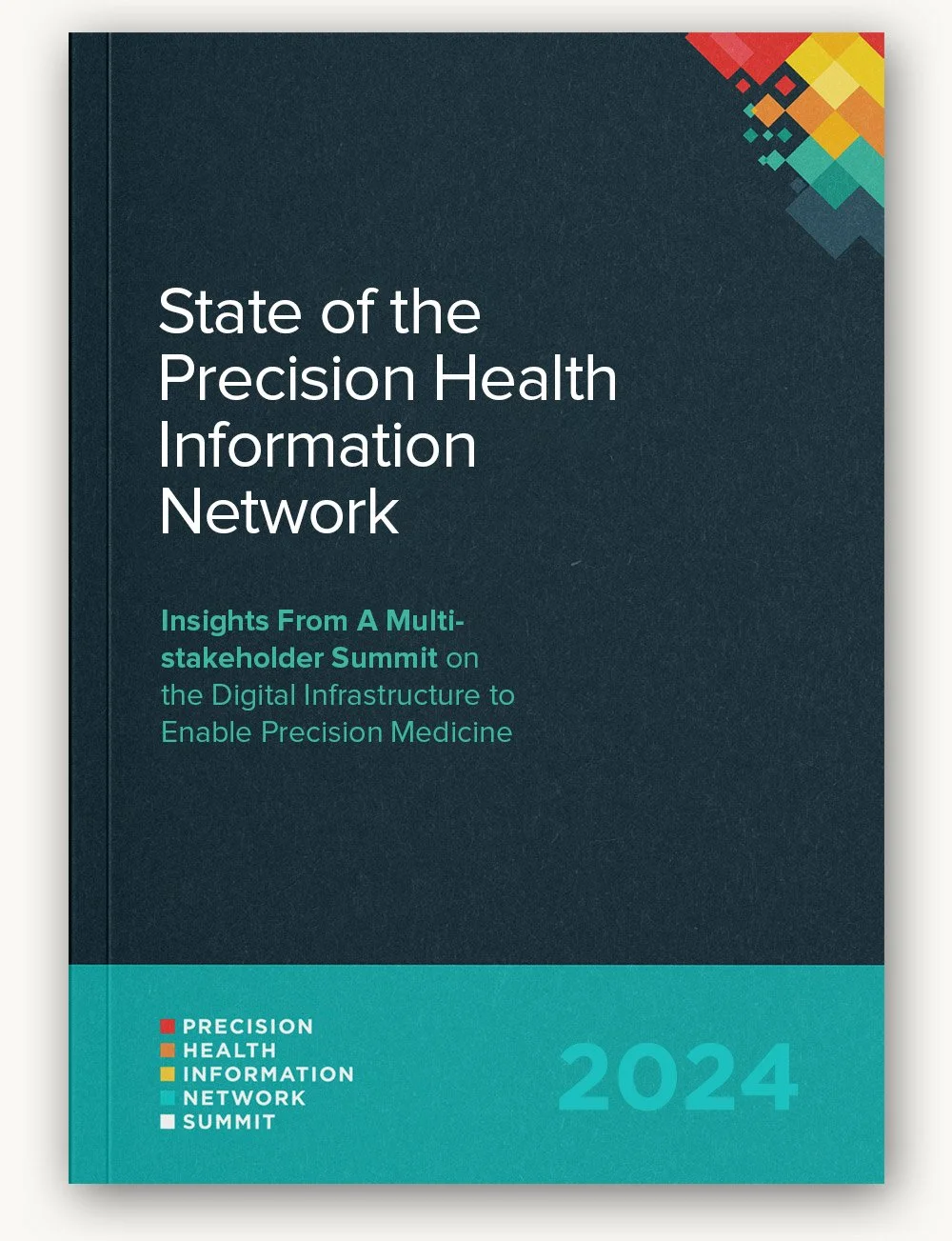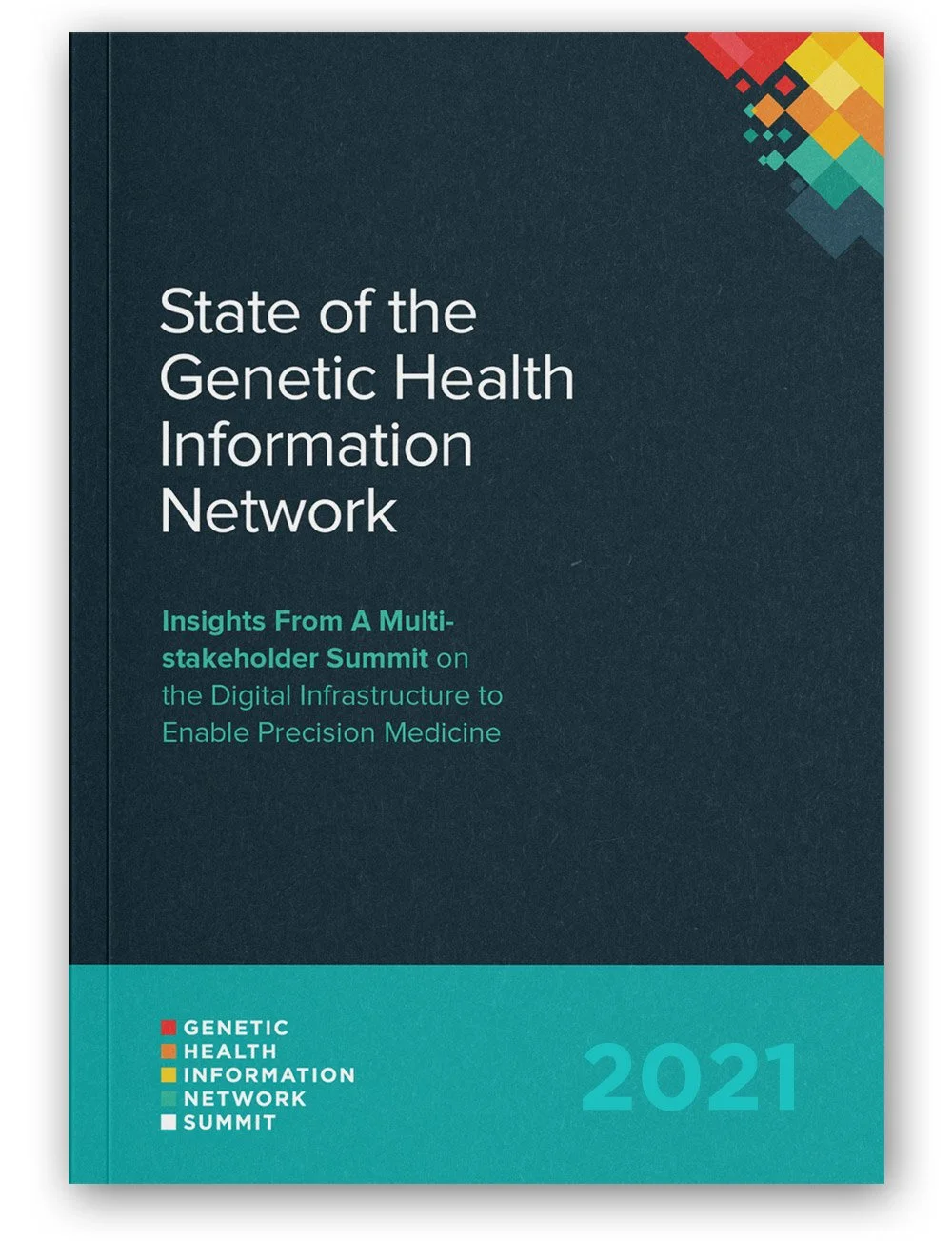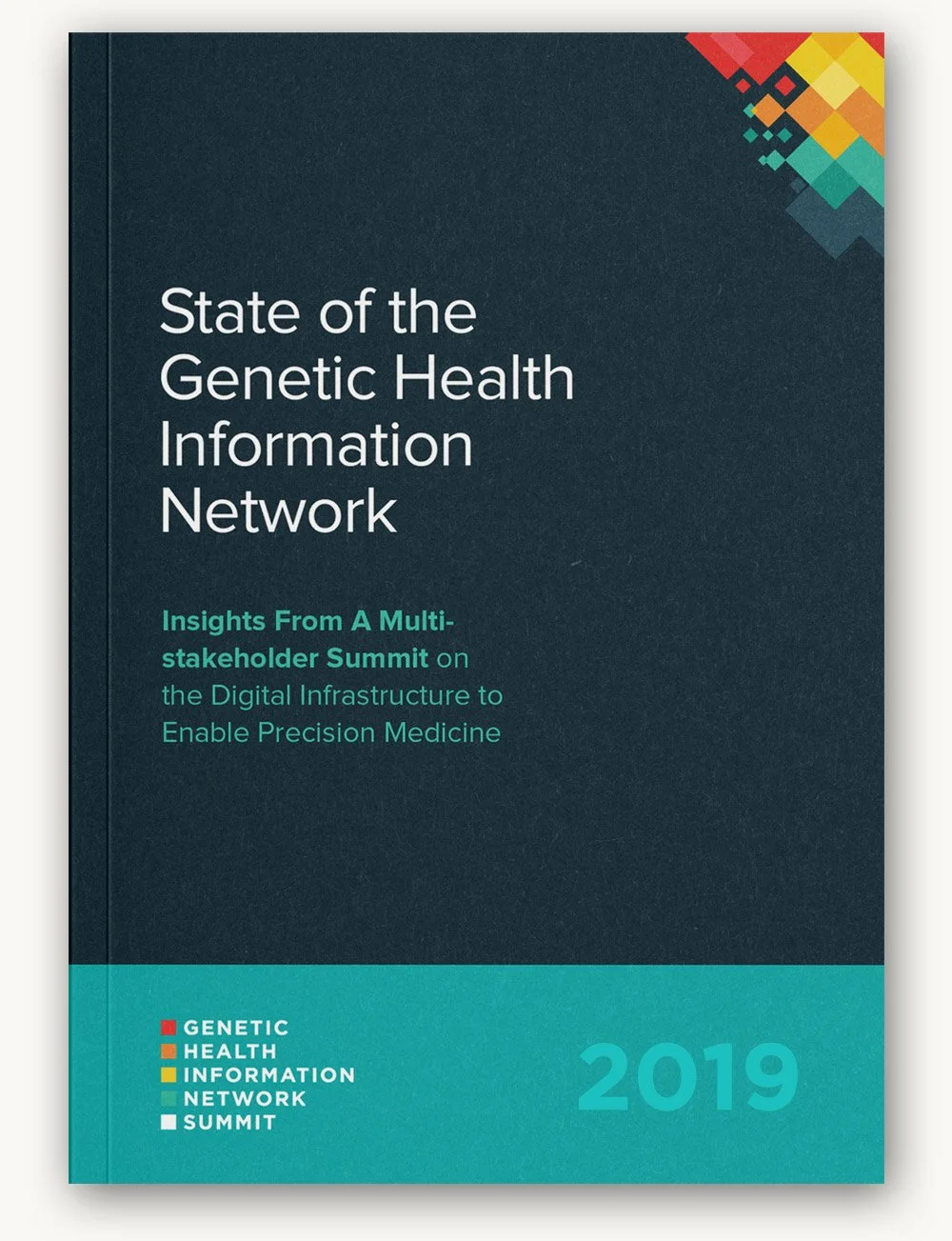WHITEPAPERS
KEY TAKEAWAYS FROM MULTI-STAKEHOLDER SUMMITS TO ADVANCE PRECISION MEDICINE (2017-2025)

2025 WHITEPAPER
SYNOPSIS
The 2025 Precision Health Information Network Summit was the 8th annual meeting in the series, and the second under a new name.
Four themes emerged from this year’s Summit:
Stakeholders, including competing ones, need to collaborate to build shared digital infrastructure; Surescripts has shown that this is possible.
Transparent standards are essential for any interoperable system, especially relevant to the precision health information network.
The scope and importance of precision diagnostics is being redefined by the proliferation of FDA-approved precision therapeutics.
As patients are using artificial intelligence (AI) to gain agency in their care, they move closer to the center of the precision health information network.
These themes were reinforced by the keynote session which discussed the digital infrastructure for electronic prescribing and the applicable lessons for precision diagnostics. Subsequent sessions, which bolstered the themes, were focused on the regulatory and governance landscape of precision health, the current state of precision oncology, advancements in diagnostics for age-related conditions and treatments for rare diseases, and how laboratory businesses are innovating in challenging markets.
Download the whitepaper to read more.
WORKING MEETING SUMMARIES
2024 WHITEPAPER
SYNOPSIS
At the 2024 Precision Health Information Network Summit—its seventh gathering and the first under a new name—leaders from across the healthcare ecosystem convened in Nashville to chart the future of diagnostics-informed medicine. Sessions explored the economic, regulatory, and technological shifts reshaping diagnostics, while spotlighting persistent challenges in rare disease navigation, women’s health disparities, and oncology implementation. A new pre-meeting format deepened collaboration around clinical decision support and biomarker testing. Throughout the Summit, participants emphasized real-world obstacles and solution-driven case studies, reaffirming the event’s role as a catalyst for cross-sector progress in precision health.
Five impactful themes emerged that differentiated the discussion from previous meetings:
Challenging market conditions threaten the sustainability of current
lab business models.
While recent investments are leading to advancements in diagnostics for women's health, historical underinvestment means many conditions remain under addressed.
Despite technology innovation in rare disease and real-world data, widespread collaboration and data sharing for individual patient navigation is still manual, time-consuming, and burdensome.
Clinically valid diagnostic tests are still underutilized in oncology, and the ongoing multi-stakeholder collaboration needed to increase access and use has not yet reached critical mass.
The FDA LDT rule, now struck down, was set to reshape the market.
Download the whitepaper to read more.
2023 WHITEPAPER
SYNOPSIS
At this Summit, sessions dove deep into the changing paradigm of cancer screening and surveillance, the state of rare disease drug discovery, and precision medicine in adults beyond oncology. The continuation of the “case study” format enabled participants to share successes in multi-stakeholder collaboration. Finally, individuals shared powerful stories of their personal journey with precision medicine as patients and advocates.
Three impactful themes emerged that differentiated the discussion from previous meetings:
While diagnostic testing provides an unprecedented number of useful applications, the frameworks for understanding the benefits and outcomes across the care continuum are insufficient.
The technology for precision health has largely arrived, but the patient experience has not.
Precision health will be more than genomic; it will be multi-omic.
Download the whitepaper to read more.
2022 WHITEPAPER
SYNOPSIS
At this Summit, sessions dove deep into prevention and population screening, rare disease diagnostics, and molecular oncology. In addition, a new “case study” format enabled participants to share successes in multi-stakeholder collaboration fostered among organizations and individuals who have participated in previous Summits over the years.
Five impactful themes emerged that differentiated the discussion from previous meetings.
A new paradigm of recurring testing is taking hold, raising many challenges and opportunities.
A “genome for everyone” is not coming soon despite the growing evidence of the benefit of whole genome sequencing (WGS).
Leading electronic health record (EHR) vendors have released genomics modules, but transmission of structured test results remains infrequent.
Automation in prior authorization is happening on a pilot basis.
Direct patient engagement is driving valuable genomics use cases.
Download the whitepaper to read more.
2021 WHITEPAPER
SYNOPSIS
Uniquely this year, the group took stock of the enormous impact of the COVID-19 pandemic on science, technology, policy, consumer expectations, and the healthcare system as a whole. In addition, sessions dug deep into precision oncology, data and learning systems, and evidence development in the genetic testing space.
In particular, three impactful themes emerged that differentiated the discussion from previous meetings.
The COVID-19 pandemic sent clinical diagnostics and digital health infrastructure trends into overdrive.
Evidence development is undergoing a radical and irrevocable change in response to a growing appetite for rapid, targeted, distributed clinical trials and real world evidence.
Democratization of healthcare through access to technology is accelerating.
Each of these is unpacked in the paper, and a call for case studies at the upcoming Summit is issued.
2019 WHITEPAPER
SYNOPSIS
As genetics extends into clinical and consumer marketplaces, healthcare stakeholders face a growing set of challenges. In order to meet expectations and deliver on the promise of precision medicine, an effective cross-stakeholder information network for genetics is needed. Operationalizing such a network requires active collaboration.
At the 2019 Summit, the following key themes emerged:
Diagnostics is (still) a data business. Genetic data interoperability is vital, yet lacking.
Security and privacy models are not sufficiently mature to enable clinical care, data sharing, and research.
Gaps in genetic knowledge are widening between healthcare stakeholders. This mismatch is creating friction in the system.
Patients and consumers want access to personalized care on their terms. This will require significant advances in system integration.
As healthcare moves to value-based care, the importance of genetics must be understood alongside other factors, such as social determinants of health.
The substance of this discussion was documented for this Whitepaper, which includes key implications important topics of discussion for the 2020 Genetic Health Information Network Summit.
2018 WHITEPAPER
SYNOPSIS
Despite concerted efforts from stakeholders across the healthcare system, challenges persist in delivering precision medicine reliably, efficiently, and cost-effectively. Because critical challenges manifest at the intersections between stakeholder—or are inherent to the information systems that connect them—no individual stakeholder can solve them alone. Instead, active collaboration is required.
At the 2018, the following key themes emerged:
Frameworks and transparency around test quality and value remain limited
Data has replaced oil as the world’s most valuable resource
The promise of precision cures is becoming a reality, but barriers remain
Providers still need genetics incorporated into their workflow
Consumers are driving the market and forcing a health system response
Disruptors are coming from outside of healthcare
The key implications of this discussion were documented for this Whitepaper, which include important topics of discussion for future events.
2017 WHITEPAPER
SYNOPSIS
Genetics offers enormous promise for human health, and for enabling our healthcare system to deliver better outcomes and greater value. However, the practical barriers to integrating genetics into clinical care delivery are undeniable. Because genetics is inherently data-intensive, critical challenges relate to the data and digital infrastructure that span across research, care delivery, and payment.
At the inaugural Genetic Health Information Network Summit, a group of leaders from across the healthcare ecosystem came together to discuss the shortcomings and potential improvements to the infrastructure connecting genetic information in healthcare. The group surfaced five core issues:
Genetic testing laboratory quality and patient safety;
Clinical validity, utility, and value assessment at scale;
Genetic test identification for market tracking, evidence-gathering, billing, and payment;
Provider education, communication, and support at the point-of-care; and
Patient access and control of genetic data.
The substance of this discussion was documented for this Whitepaper, which includes key observations and most promising potential solutions.
PAST AUTHORS & ORGANIZERS
Titles and organizational affiliations are reflective of the time of the previous Summit and may have since changed.
-
FRANCIS COLLINS, MD, PhD
Acting Science Advisor to the President of the United States
White House -
CARLOS BUSTAMANTE, PhD
Founder & CEO
Galatea Bio -
TRISH BROWN, MS, CGC
Genomics and Precision Medicine Program Director
Aetna -
GILLIAN HOOKER, PhD, ScM, CGC
Chief Scientific Officer
Concert Genetics -
SUZANNE BELINSON, PhD, MPH
VP, Commercial Markets
Tempus -
PRISCILLA ALFARO, MD
VP, Payment Integrity
BCBS North Carolina -
VINCENT NELSON, MD
SVP & Deputy CMO
Centene -
ROBERT NUSSBAUM, MD
Chief Medical Officer
Invitae -
ANDY CORTS
SVP, Research & Analytics
SignalPath, a Verily company -
BEN HO PARK, MD, PHD
Professor & Director, Division of Hematology and Oncology
Vanderbilt University Medical Center -
ESTEBAN LÓPEZ
Chief Medical Officer, Clinical Strategy Innovation
HCSC (BCBS of IL, MT, NM, OK & TX) -
SIMON BARNETT
Genomics Analyst
ARK Invest -
DEE ANNA SMITH
CEO
Sarah Cannon -
GEORGE CARDOZA
Senior Vice President, Chief Financial Officer
NeoGenomics -
SEAN HOFHERR, PhD
Chief Scientific Officer
GeneDx, Inc. -
JULIE M EGGINGTON, MS, PhD
Co-founder & CEO
Center for Genomic Interpretation -
ERYNN GORDON, MS, LCGC
VP, Clinical Operations
Genome Medical -
NIKOLETTA SIDIROPOULOS, MD
Medical Director, Genomic Medicine, Department of Pathology and Laboratory Medicine
University of Vermont Health Network -
PHILLIP FEBBO, MD
SVP & Chief Medical Officer
Illumina -
HOWARD LEVY, MD, PhD
Associate Professor of Medicine
Johns Hopkins Medicine -
KATE DONIGAN, PHD
Deputy Director, Personalized Medicine & Molecular Genetics (acting)
FDA -
JILL HAGENKORD, MD
Chief Medical Officer
Optum Genomics -
JIM JIRJIS, MD
Chief Health Information Officer
HCA Healthcare -
BENJAMIN SOLOMON, MD
Clinical Director, National Human Genome Research Institute (NHGRI)
NIH -
HOLLI DILKS, MD
Senior Director, Global Head of Field Medical
Foundation Medicine -
ROBERT C. GREEN, MD, MPH
Director, Genomes2People
Division of Genetics at Brigham and Women’s Hospital, the Broad Institute and Harvard Medical School -
JEFF EMCH
VP, Diagnostics Strategy, Global Oncology Marketing
GSK -
NICOLE BOICE
Founder & CEO
Global Genes -
DAVID MCCALLIE, MD
SVP, Medical Informatics
Cerner -
EDWARD ABRAHAMS, PhD
President
Personalized Medicine Coalition -
TAHA KASS-HOUT, MD
Former 1st Chief Health Informatics Officer
U.S. Food and Drug Administration (FDA) -
GIL ALTEROVITZ, PhD
Director, Biomedical Cybernetics Laboratory
Harvard Medical School -
KRISTINE BORDENAVE, MD
Corporate Medical Director
Humana -
JOSHUA DENNY, MD
Professor of Biomedical Informatics and Medicine
Vanderbilt University -
JAMES O’LEARY
Chief Innovation Officer
Genetic Alliance -
HENRY GARLICH
Director, Healthcare Value Solutions & Enhanced Clinical Programs
Blue Shield of California -
JIM ALMAS, MD
VP & National Medical Director for Clinical Effectiveness
LabCorp -
MARA ASPINALL
Managing Director and Co-Founder
BlueStone Venture Partners -
TRENT HAYWOOD, MD, JD
SVP & Chief Medical Officer
Blue Cross Blue Shield Association -
STEPHANIE DEVANEY, PHD
Deputy Director, All of Us
NIH -
EDMUND JACKSON, PHD
Chief Data Officer
HCA Healthcare -
LISA ALDERSON
Co-founder & CEO
Genome Medical -
DEBRA ESSER, MD
Chief Medical Officer
Blue Cross and Blue Shield of Nebraska -
LAURIE MCGRAW
SVP, Health Solutions
American Medical Association -
KATHRYN LANG, MD
Global Medical Strategy Head of Data Science
Pfizer -
MATT MIGHT, PhD
Director, Hugh Kaul Personalized Medicine Institute
University of Alabama at Birmingham -
VICTORIA PRATT, PhD
President
Association for Molecular Pathology -
DAWN BARRY
Co-Founder and President
Luna DNA -
ELI CASDIN
Chief Investment Officer
Casdin Capital -
ELLEN MATLOFF, MS, CGC
President & CEO
My Gene Counsel -
JULIE RAMAGE
National Accounts Director, Diagnostics
Pfizer -
ALEX DE WINTER
Managing Director
GE Ventures -
NICK NACLERIO, PhD
Founding Partner
Illumina Ventures -
BRYCE OLSON
Global Marketing Director, Health and Life Sciences
Intel








